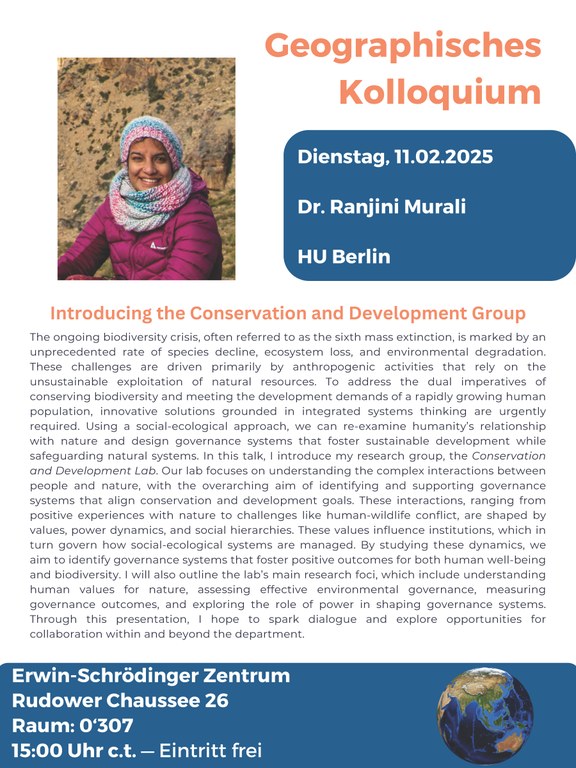11.02.2025 | 15:00 | Geographisches Kolloquium | Antrittsvorlesung Dr. Ranjini Murali
- https://www.geographie.hu-berlin.de/de/startseite-inhalte/veranstaltungen/termine-archiv/11-02-2025-geographisches-kolloquium
- 11.02.2025 | 15:00 | Geographisches Kolloquium | Antrittsvorlesung Dr. Ranjini Murali
- 2025-02-11T15:00:00+01:00
- 2025-02-11T17:00:00+01:00
- Wann 11.02.2025 von 15:00 bis 17:00
- Wo Erwin Schrödinger-Zentrum | Rudower Chaussee 16 | Raum 0'307
- Name des Kontakts Bech, Nicolas Alejandro
- Telefon des Kontakts +49 30 2093 6828
-
iCal
Liebe Institutsangehörige,
es freut mich, im Rahmen des Geographischen Kolloquiums die Antrittsvorlesung von Dr. Ranjini Murali vom Conservation and Development Lab am 11.02.2025 anzukündigen.
Das Thema des Vortrags lautet: "Introducing the Conservation and Development Group". Weitere Details können dem beigefügten Poster entnommen werden.
Wir laden herzlich ein, um 15 Uhr c.t. im Raum 0'307 des Erwin-Schrödinger-Zentrums teilzunehmen.
Mit freundlichen Grüßen,
Nicolás Bech
Dear members of the institute,
I am pleased to announce, as part of the Geographical Colloquium, the inaugural lecture by Dr. Ranjini Murali from the Conservation and Development Lab on 11.02.2025.
The title of the lecture is: "Introducing the Conservation and Development Group". Further details can be found in the attached poster.
We warmly invite you to join us at 15:00 c.t. in room 0'307 of the Erwin-Schrödinger-Zentrum.
Best regards,
Nicolás Bech
Introducing the Conservation and Development Group
The ongoing biodiversity crisis, often referred to as the sixth mass extinction, is marked by an unprecedented rate of species decline, ecosystem loss, and environmental degradation. These challenges are driven primarily by anthropogenic activities that rely on the unsustainable exploitation of natural resources.
To address the dual imperatives of conserving biodiversity and meeting the development demands of a rapidly growing human population, innovative solutions grounded in integrated systems thinking are urgently required.
Using a social-ecological approach, we can re-examine humanity’s relationship with nature and design governance systems that foster sustainable development while safeguarding natural systems. In this talk, I introduce my research group, the Conservation and Development Lab.
Our lab focuses on understanding the complex interactions between people and nature, with the overarching aim of identifying and supporting governance systems that align conservation and development goals. These interactions, ranging from positive experiences with nature to challenges like human-wildlife conflict, are shaped by values, power dynamics, and social hierarchies. These values influence institutions, which in turn govern how social-ecological systems are managed.
By studying these dynamics, we aim to identify governance systems that foster positive outcomes for both human well-being and biodiversity. I will also outline the lab’s main research foci, which include understanding human values for nature, assessing effective environmental governance, measuring governance outcomes, and exploring the role of power in shaping governance systems. Through this presentation, I hope to spark dialogue and explore opportunities for collaboration within and beyond the department.

Studentische Hilfskraft
Direktorium
Geographisches Institut
Humboldt-Universität zu Berlin
Raum: RUD16 | 2'217
Telefon: +49 30 2093 6828
